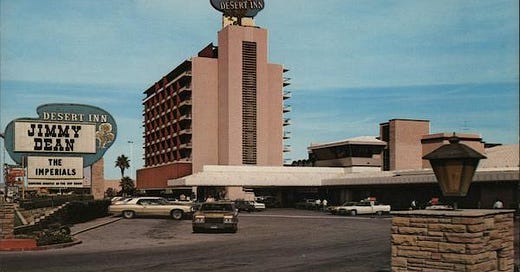Howard Hughes and the Desert Inn
Reclusive billionaire entered the casino business 56 years ago this month
I wrote a book about Howard Hughes, so I suppose it’s inevitable that he will show up from time to time in this space. The 56th is not a great anniversary on which to base a piece of writing, but at least we’re in the right month.
It was in March of 1967 that Hughes acquired the Desert Inn — his first casino. But let’s clarify a few things about exactly what Hughes did. In fact, Hughes did not buy the Desert Inn. Rather, he paid $13.2 million for the right to operate the hotel-casino. The buildings and the land beneath them were retained by Moe Dalitz and his partners.
Further, under the terms of the lease, Hughes had to pay Dalitz & Co. another $1.1 million per year, and he was also responsible for ALL the bills, including taxes, insurance and maintenance.
Clearly, this was a very good deal for Dalitz.
Ah, but there’s more. Neither Hughes nor his top executives had any experience running a casino. They needed someone to help them navigate the complexities of the gambling business. Dalitz was kind enough to offer his services — free of charge.
This is where we turn to educated conjecture. What did Dalitz have to gain from serving as a pro bono consultant to Hughes? More than a few observers say the skimming that had plagued mob-controlled Las Vegas casinos for years continued at the Desert Inn after the strait-laced Hughes took over. One compelling piece of evidence was the Desert Inn’s sudden poor performance after Hughes took over.
Bob Maheu, Hughes’ right-hand man in Las Vegas at this time, told me in 2007 that the respected accounting firm Hughes brought in to oversee the Desert Inn’s finances precluded the possibility of skimming. But of course an accounting firm can count only the dollars that are available to count. The very nature of skimming is that someone is removing cash from the till before the suits get their coffee and turn on their adding machines each morning.
Las Vegas journalist Sergio Lalli, in a chapter about Hughes for The Players: The Men Who Made Las Vegas, asserted that the mob fleeced the Hughes-run casinos. “While the inexperienced Hughes executives wallowed in their big offices, the casino employees who had been there from the early days may have helped themselves to what they could. It must have been a free-for-all. Casino associates working in league with [mobster Johnny] Rosselli were very likely skimming funds. But it may not have stopped there. Since the mob no longer had a hidden ownership interest in the properties, it did not really matter who else, among the other working stiffs in the casino, stole money. It may have been an unsupervised skim, existing on several levels of freelancing.”
Perhaps. Note that Lalli is careful with his language — “may have,” “must have been,” “very likely” — and does not cite any sources. I’m sure he had informed people he talked to who presented this scenario to him, but I don’t know that for sure.
It’s a question I wanted to ask Lalli himself. I had not spoken with him or heard anything about him in many years, so I turned to the internet to see if I could track him down. Just this evening, I discovered that he died in 2021. He was riding a bicycle in Bisbee, Arizona, when he was struck by a motorist and killed.
Digging a little further, I discovered that Lalli was a “beloved figure” in Bisbee. He self-published several books, fiction and nonfiction, including a novel set in Bisbee. He also produced a number of videos about people and places in the quirky town that he posted on YouTube. They are still there.
But I digress. Back to Hughes briefly.
Howard Hughes ended up buying seven casinos in Nevada — six in Las Vegas and one in Reno. He didn’t do much with them when he was alive, and he lost a lot of money through their mismanagement (and possible skimming). But the casinos paid off in the end. His heirs sold them all at prices well above what Hughes paid for them.
Interestingly, not one of Hughes’ seven casinos still stands. The Desert Inn, Sands, Frontier, Silver Slipper, Castaways and Landmark are all gone, as is Harold’s Club in Reno.




Thanks for the story. Always interested.
To bradwww and Carlson: I don't have the details in front of me but I believe that Summa Corp. ended up buying the Desert Inn lease -- in other words, acquiring the buildings and land -- sometime after Hughes died in 1976. When I gather more detailed information on this, I will report on it here.